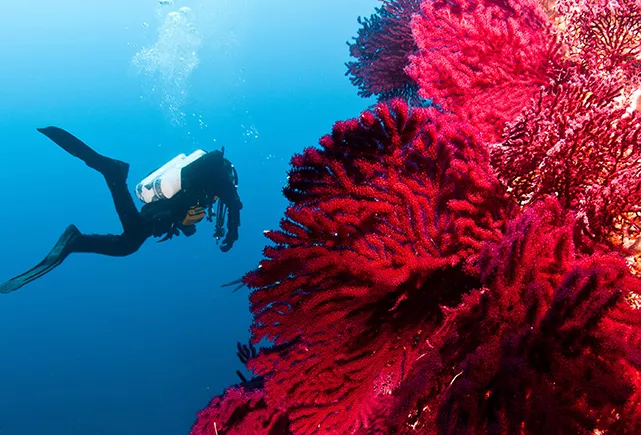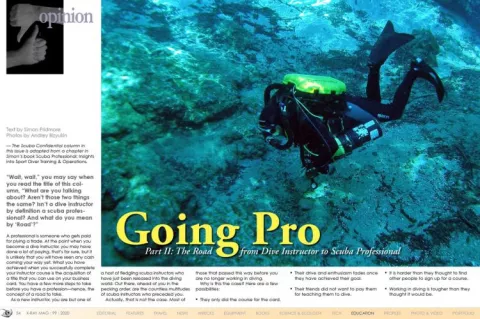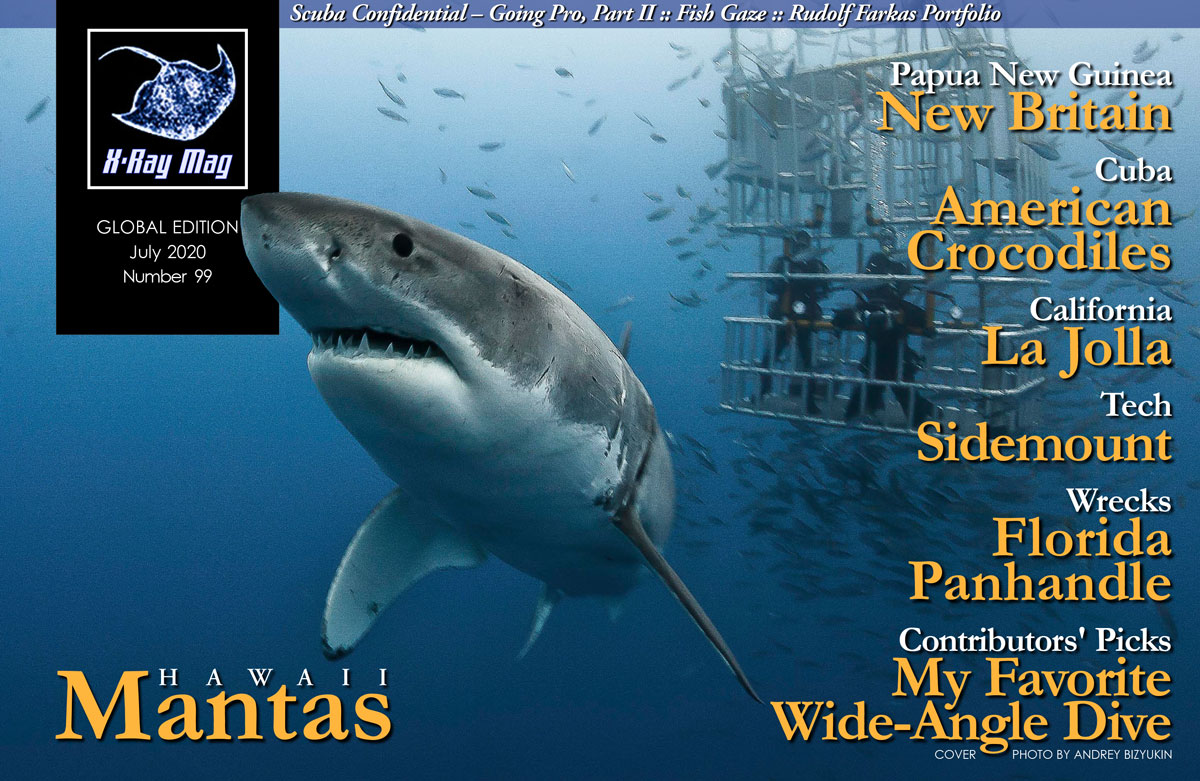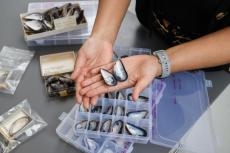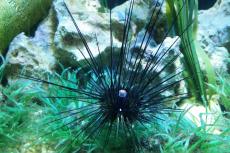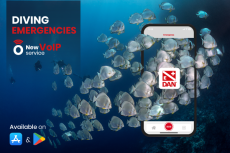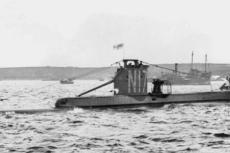“Wait, wait,” you may say when you read the title of this column, “What are you talking about? Aren’t those two things the same? Isn’t a dive instructor by definition a scuba professional? And what do you mean by ‘Road’?”
Contributed by
Factfile
This Scuba Confidential column in issue #99 is adapted from a chapter in Simon’s book Scuba Professional: Insights into Sport Diver Training & Operations.
Simon Pridmore is the author of the international bestsellers Scuba Confidential: An Insider’s Guide to Becoming a Better Diver, Scuba Professional: Insights into Sport Diver Training & Operations and Scuba Fundamental: Start Diving the Right Way.
He is also the co-author of the Diving & Snorkeling Guide to Bali and the Diving & Snorkeling Guide to Raja Ampat & Northeast Indonesia.
His recently published books include Scuba Exceptional: Become the Best Diver You Can Be, Scuba Physiological: Think You Know All About Scuba Medicine? Think Again! and the Dining with Divers series of cookbooks.
For more information, see his website at: SimonPridmore.com.
A professional is someone who gets paid for plying a trade. At the point when you become a dive instructor, you may have done a lot of paying, that’s for sure, but it is unlikely that you will have seen any cash coming your way yet. What you have achieved when you successfully complete your instructor course is the acquisition of a title that you can use on your business card. You have a few more steps to take before you have a profession—hence, the concept of a road to take.
As a new instructor, you are but one of a host of fledgling scuba instructors who have just been released into the diving world. Out there, ahead of you in the pecking order, are the countless multitudes of scuba instructors who preceded you.
Actually, that is not the case. Most of those that passed this way before you are no longer working in diving.
Why is this the case?
Here are a few possibilities:
- They only did the course for the card.
- Their drive and enthusiasm fades once they have achieved their goal.
- Their friends did not want to pay them for teaching them to dive.
- It is harder than they thought to find other people to sign up for a course.
- Working in diving is tougher than they thought it would be.
- Working in diving does not pay as well as they thought it would.
- They find out that it is actually diving they like, rather than teaching, and that as an instructor, they do a lot of teaching and not much diving.
- They discover that they do not know as much about diving as they thought they did, and suddenly, as an instructor, they feel they are supposed to know everything, which makes them very uncomfortable.
One or a combination of these factors is usually what causes new instructors to drop out of the game. Of course, a lot of this has to do with the fact that people often sign up to become an instructor without really understanding what is involved. I wrote about this in my article "Going Pro—Part One,” in issue #98 of X-Ray Mag.
Anyway, assuming you have become a dive instructor, are happy with your lot and have no intention of giving it up, what can you do to try to ensure that you will be one of those happy few who end up enjoying a long and fruitful career in this wonderful sport? Here are a few top tips.
Keep learning
Practise your personal diving skills constantly. Then, at the point when you think your skills are perfect, practise some more. Everything you do in the water needs to be absolutely instinctive in order to permit you to devote 100 percent of your attention to your students and/or the divers in your charge. Dive as much as you can, in as many different environments and conditions as possible. Stay within your personal comfort zone but try to push the envelope out little by little. When you pass knowledge on, you are more credible if you speak from a reservoir of personal experience.
When you teach, do not just parrot what the manuals say. Make sure you understand the background to what you are telling people. Read widely, especially books about the psychology, physiology and decompression theory in diving. Do not get fixated on established protocols. Be open to new ideas and ways to do things, but question everything.
Build on the basic underwater management and control skills you were taught on your instructor course. Learn to observe and interpret behaviour so you can anticipate problems before they occur. Seize upon any chance that comes along to work with and learn from more experienced colleagues. Such opportunities are rare in scuba diving as most instructors work alone—but, if you get lucky, make the most of it.
Undertake more diving courses. Look particularly at technical diving, diving in wrecks, in caves or under ice. Even as an experienced scuba instructor, you may feel like a complete beginner again, but embrace the challenge. When you return to single cylinder no-decompression-stop diving after training like this, you will be astonished at the new levels of competence you have acquired.
Work on your employability
If you do not already have a commercial background, then do some small business courses so you understand at least the basics of accounting, marketing, staff management and maintaining cash flow. Dive centres, liveaboards and resorts are primarily businesses after all.
Review the life skills you may have acquired elsewhere over the years. Operators of dive liveaboards and resorts love to take on people with a hospitality background. All dive operations have a lot of machinery, from regulators and rebreathers to compressors and boat engines, so if you have mechanical or engineering skills, you will be much in demand. The same applies if you can speak multiple languages or have studied marine biology. All these things make you more employable and will help you negotiate better pay and benefits.
Look after the pennies
Many instructors drop out of diving because they have not taken their finances seriously and are forced to leave the work and the life they love and return to the non-diving world simply on economic grounds. This is usually because they have not approached their work and career in a professional way. They have not taken a long-term view.
Scuba diving jobs are not well paid. But that does not mean that you need to struggle. Often, your work takes you to remote places where there are few entertainment options and, although your wages may be small, your board and lodging will be provided free of charge, so you will have no expenses. There is a good chance too that your wages will be supplemented by tips.
People react to this lifestyle in one of two ways. Some spend their time in paradise just dreaming of being elsewhere and planning what a great time they are going to have when they get back to “civilisation.” They then blow all their money on entertainment and new toys, returning to work a couple of weeks later penniless.
Others take advantage of the opportunity to save their money, start up an investment portfolio or buy a small apartment back home to rent out and make a little extra. Meanwhile, they look ahead in their career and make a plan to perhaps become an industry leader or even one day start their own dive business and become an employer rather than an employee.
Takeaways
Being a dive professional is an exciting career and can bring enviable lifestyle rewards. But it takes focus and determination to succeed. You need to work at it, as you would in any other walk of life. Be ready and willing to learn and progress—and always keep an eye on the money. ■

